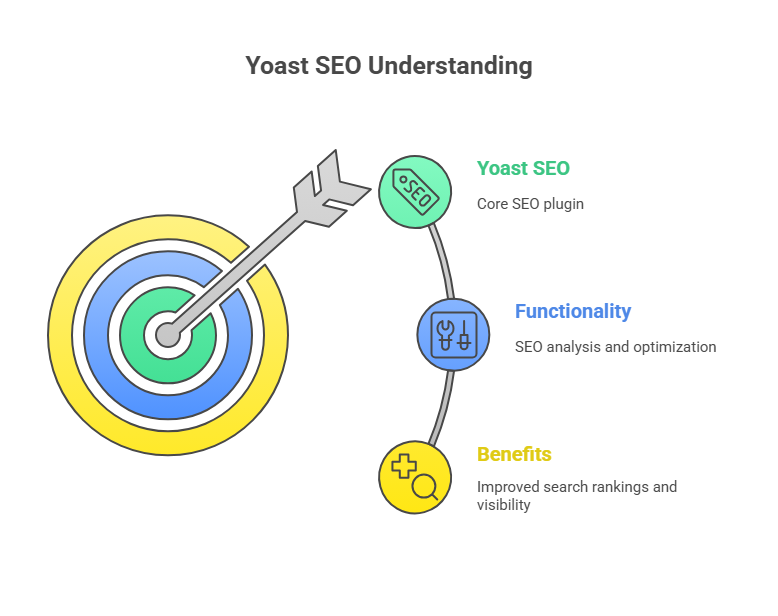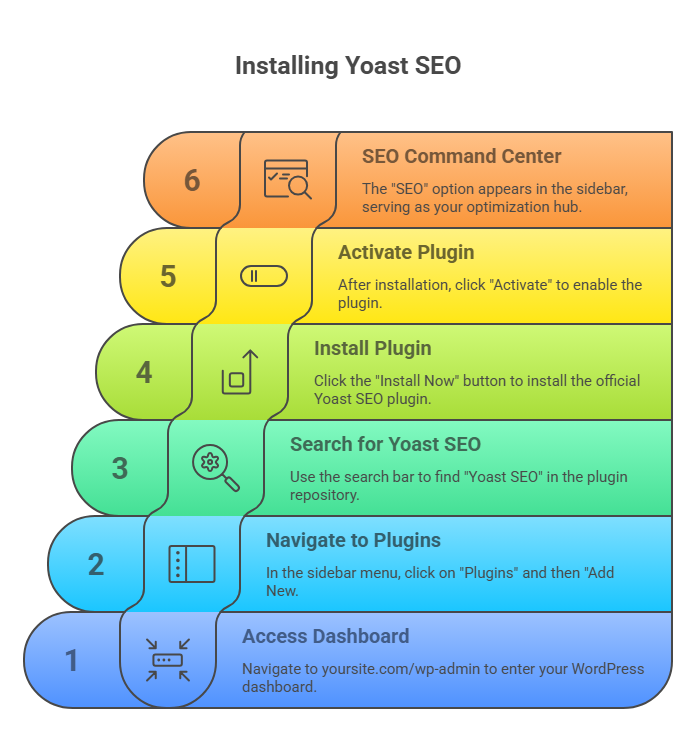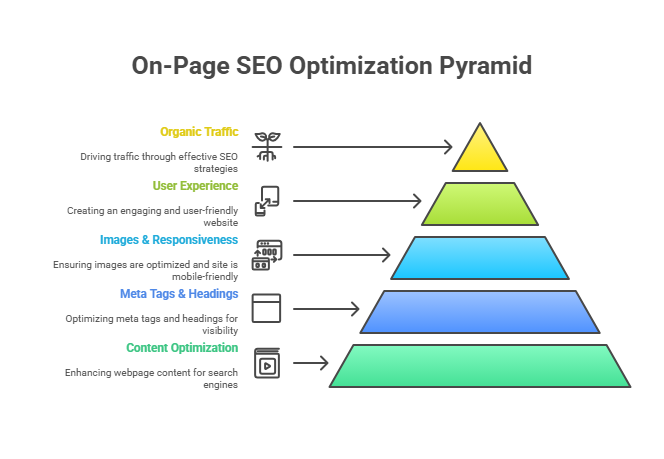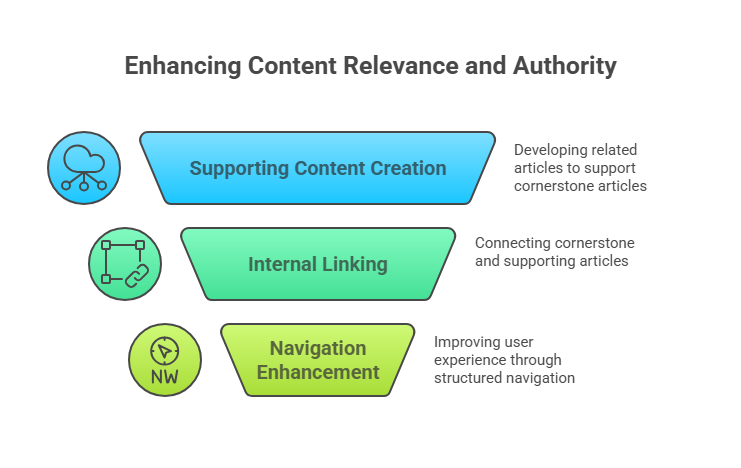WordPress powers over 43.2% of all websites globally, yet most site owners struggle with search engine optimization.
The difference between websites that rank on Google’s first page and those buried on page ten often comes down to one critical factor: proper SEO implementation.
Yoast SEO eliminates the complexity of technical SEO, making it accessible for everyone from bloggers to enterprise businesses.
This comprehensive guide will transform your WordPress site into a search engine magnet using proven strategies that have helped over 12 million websites improve their rankings.
By implementing the tactics in this tutorial, you’ll learn to:
- Configure Yoast SEO for maximum search visibility
- Optimize content using data-driven keyword strategies
- Leverage advanced features most users ignore
- Connect Google tools for performance tracking
- Avoid common mistakes that hurt rankings
So, Let’s get started .
What Is Yoast SEO? How It Works and Why You Need It

Yoast SEO is one of the most popular WordPress plugins designed to help website owners optimize their content for search engines. Whether you’re a blogger, small business owner, or digital marketer, Yoast SEO acts like your personal SEO assistant.
It simplifies the complex world of search engine optimization by giving you real-time suggestions as you write — from improving keyword usage and readability to ensuring your meta titles and descriptions are properly formatted.
The plugin uses a traffic light system (green, orange, red) to guide you on how well your content is optimized. It also handles crucial behind-the-scenes technical SEO tasks like generating XML sitemaps, setting canonical URLs, and controlling how your site appears in search results.
By following Yoast’s actionable recommendations, you can make sure your content is both user-friendly and search engine-friendly — a key combination for ranking higher on Google.
Installing and Configuring Yoast SEO

Complete Installation Process
Installing Yoast SEO correctly sets the foundation for your entire SEO strategy. Here’s the step-by-step process:
- Access your WordPress dashboard by navigating to yoursite.com/wp-admin
- Navigate to Plugins → Add New in the sidebar menu
- Search for “Yoast SEO” in the plugin repository
- Install the official plugin by Team Yoast (verified with checkmark)
- Activate the plugin immediately after installation
Once activated, you’ll see “SEO” appear in your WordPress sidebar. This becomes your command center for all optimization activities.
Essential Configuration Settings
The initial configuration wizard guides you through critical settings. Don’t skip this process as it automatically configures schema markup and social integrations.
General Settings Optimization:
- Enable both SEO analysis and readability analysis
- Activate cornerstone content feature for priority pages
- Turn on text link counter for internal linking insights
- Enable IndexNow for faster content indexing
Search Appearance Configuration:
- Set site title format: {{title}} {{page}} {{sep}} {{sitename}}
- Create compelling homepage meta description
- Enable breadcrumbs for improved navigation
- Configure organization schema markup
Social Media Integration
Social signals indirectly impact SEO through increased engagement and brand visibility. Configure these settings under SEO → Social:
- Upload default Open Graph and Twitter Card images
- Verify Facebook page ownership
- Add Twitter username for enhanced social previews
- Configure LinkedIn and Pinterest metadata
Mastering the Yoast SEO Interface
Understanding the Dashboard Components
Yoast SEO operates through three main interfaces, each serving specific optimization purposes:
1. Main SEO Menu (Sidebar)
Your optimization headquarters includes:
- General: Overview dashboard and configuration
- Search Appearance: Global meta settings and templates
- Social: Platform-specific optimization
- Tools: Import/export and bulk editing features
- Integrations: Third-party tool connections
2. Post/Page Meta Box
The content-level optimization interface features three crucial tabs:
- SEO tab: Focus keyphrase and meta optimization
- Readability tab: Content structure analysis
- Social tab: Social media preview customization
2025 Feature Updates
Yoast has introduced several game-changing features that enhance optimization capabilities:
IndexNow Integration:
This Microsoft-Google collaboration feature instantly notifies search engines about content updates, reducing indexing time from days to hours.
Enhanced Block Editor Support:
- FAQ blocks with automatic schema markup
- How-to blocks for step-by-step content
- Table of contents generation
- Improved heading distribution analysis
Advanced Keyword Distribution Analysis:
The updated algorithm provides more nuanced feedback about keyword placement, helping avoid over-optimization while maintaining topical relevance.
Advanced On-Page SEO Optimization

Strategic Focus Keyphrase Selection
Focus keyphrase selection determines your content’s search visibility. Most users choose keywords based on intuition rather than data, resulting in poor rankings.
The Three-Layer Keyword Research Method:
Layer 1: Seed Keyword Identification
- Analyze your target audience’s search behavior
- Use Google Search Console to identify existing ranking keywords
- Research competitor keyword strategies using Ahrefs or SEMrush
Layer 2: Intent Classification
- Informational: “how to optimize Yoast SEO”
- Commercial: “best WordPress SEO plugin”
- Transactional: “buy Yoast SEO premium”
- Navigational: “Yoast SEO dashboard”
Layer 3: Competition Analysis
- Evaluate first-page content quality
- Assess domain authority of ranking sites
- Identify content gaps you can fill
Meta Title and Description Optimization
Meta elements serve as your search result advertisement. Optimized meta tags can increase click-through rates by up to 30%.
Meta Title Best Practices:
- Keep titles under 60 characters for full visibility
- Place primary keyword within first 30 characters
- Include power words like “complete,” “ultimate,” “guide”
- Add current year for freshness signals
Meta Description Optimization:
- Maintain 150-160 character limit
- Include primary and secondary keywords naturally
- Write compelling value propositions
- Include clear calls-to-action
Content Readability Optimization
Google’s algorithm increasingly prioritizes user experience signals, making readability a crucial ranking factor.
Readability Factors Yoast Analyzes:
- Sentence length: Average 15-20 words per sentence
- Paragraph structure: Maximum 150 words per paragraph
- Subheading frequency: Every 250-300 words
- Passive voice usage: Less than 10% of total sentences
- Transition word density: Minimum 30% of sentences
Advanced Readability Strategies:
- Use bullet points for complex information
- Include numbered lists for sequential processes
- Break up text with relevant images and videos
- Implement white space for visual breathing room
Professional SEO Strategies
Cornerstone Content Development
Cornerstone content represents your site’s most comprehensive, authoritative pages. These pillar articles establish topical authority and drive significant organic traffic.
Cornerstone Content Characteristics:
- Comprehensive coverage of primary topics (2,500+ words)
- High search volume keyword targeting
- Extensive internal linking from supporting content
- Regular updates with fresh information
- Multiple content formats (text, images, videos)
Implementation Process:
- Identify your 10-15 most important topics
- Create comprehensive guides for each topic
- Mark content as cornerstone in Yoast meta box
- Build topic clusters linking to cornerstone pages
- Monitor performance and continuously optimize
Strategic Internal Linking
Internal linking distributes page authority throughout your site and helps search engines understand content relationships.
Advanced Internal Linking Strategies:
Hub and Spoke Model:
- Create comprehensive hub pages for main topics
- Link supporting articles to relevant hubs
- Use descriptive anchor text with target keywords
- Maintain consistent linking patterns
Content Clustering Approach:
- Group related content into thematic clusters
- Link all cluster content to the pillar page
- Cross-link between cluster articles
- Update older content with links to new articles

Schema Markup Implementation
Schema markup helps search engines understand your content context, leading to rich snippets and enhanced search visibility.
Yoast Automatic Schema Types:
- Article schema: Author, publication date, headline
- Organization schema: Business information and social profiles
- Website schema: Site structure and navigation
- Breadcrumb schema: Page hierarchy information
Advanced Schema Opportunities:
- FAQ schema for question-based content
- How-to schema for tutorial articles
- Recipe schema for food-related content
- Product schema for e-commerce pages
- Local business schema for service providers
Google Tools Integration
Search Console Connection Benefits
Connecting Google Search Console with Yoast SEO provides direct access to search performance data within your WordPress dashboard.
Integration Benefits:
- Real-time indexing status updates
- Keyword performance tracking
- Click-through rate analysis
- Mobile usability insights
- Core Web Vitals monitoring
Setup Process:
- Navigate to SEO → General → Webmaster Tools
- Click “Get Google Authorization Code”
- Sign in with your Google account
- Grant necessary permissions to Yoast
- Copy and paste the authorization code
- Select your Search Console property
Google Analytics 4 Integration
GA4 integration enables comprehensive traffic analysis and conversion tracking for SEO performance measurement.
Key Metrics to Monitor:
- Organic search traffic trends
- Page engagement metrics
- Conversion attribution from organic search
- User behavior flow patterns
- Content performance comparisons
Performance Tracking Methodology
Weekly SEO Health Checks:
- Review Search Console for indexing issues
- Analyze top-performing pages for optimization opportunities
- Identify high-impression, low-click pages
- Monitor keyword ranking changes
- Check for manual penalties or warnings
Monthly Deep Analysis:
- Content gap analysis using keyword data
- Competitor ranking movement tracking
- Internal linking effectiveness review
- Technical SEO audit completion
- Conversion rate optimization assessment
E-commerce SEO with WooCommerce
WooCommerce SEO Extension Setup
The Yoast WooCommerce SEO extension provides specialized optimization features for online stores, including enhanced product schema and inventory management integration.
Premium Extension Features:
- Advanced product schema markup
- Global identifier support (GTIN, MPN, ISBN)
- Brand and manufacturer schema
- Product gallery optimization
- Category and filter SEO management
Product Page Optimization
Product Title Optimization:
- Include primary keyword and product attributes
- Maintain 60-character limit for search visibility
- Use brand name for authority signals
- Include specific model numbers or variations
Product Description Best Practices:
- Write unique descriptions for each product
- Include relevant keywords naturally
- Focus on benefits over features
- Use bullet points for specifications
- Include sizing and compatibility information
Rich Snippets for Products
Product rich snippets significantly increase click-through rates by displaying price, availability, and review information directly in search results.
Rich Snippet Elements:
- Star ratings from customer reviews
- Current pricing and sale information
- Stock availability status
- Brand and manufacturer details
- Product variant information
Long-term SEO Strategy
Content Audit Methodology
Regular content audits identify optimization opportunities and prevent content decay that hurts search rankings.
Quarterly Audit Process:
Performance Assessment:
- Export Search Console performance data
- Identify top and bottom-performing content
- Analyze keyword ranking changes
- Review internal linking distribution
- Assess content freshness and accuracy
Content Categorization:
- High performers: Optimize further for related keywords
- Underperformers: Refresh content and improve targeting
- Outdated content: Update information and republish
- Thin content: Expand or consolidate with related pages
- Duplicate content: Canonicalize or redirect appropriately
SEO Workouts in Yoast Premium
Yoast Premium includes guided SEO workouts that systematically improve different optimization aspects.
Available Workout Types:
- Cornerstone workout: Identifies and optimizes priority content
- Internal linking workout: Improves site architecture
- Orphaned content workout: Finds unlinked pages
- Keyphrase distribution workout: Balances keyword targeting
Continuous Optimization Process
Monthly Optimization Tasks:
- Complete one SEO workout session
- Update 5-10 older posts with fresh information
- Analyze and improve low-performing meta descriptions
- Add internal links to new content
- Monitor and address technical SEO issues
Common Mistakes and Solutions
Critical SEO Mistakes to Avoid
Mistake 1: Prioritizing Yoast Signals Over Content Quality
The Problem: Users focus on achieving green lights rather than creating valuable content.
The Solution: Use Yoast as guidance while prioritizing user value and natural language. Google rewards helpful content over perfect optimization.
Mistake 2: Keyword Stuffing for Green Scores
The Problem: Forcing keywords unnaturally into content to satisfy Yoast recommendations.
The Solution: Focus on semantic relevance and natural keyword variations. Modern search algorithms understand context and intent.
Mistake 3: Neglecting Mobile Optimization
The Problem: Optimizing only for desktop while ignoring mobile user experience.
The Solution: Test all optimizations on mobile devices and prioritize mobile-first design principles.
Mistake 4: Inconsistent Optimization Efforts
The Problem: Sporadic optimization without systematic approach.
The Solution: Establish regular optimization schedules and use Yoast workouts for consistent improvement.
Advanced Troubleshooting
Schema Markup Issues:
- Test schema implementation using Google’s Rich Results Test
- Validate structured data for errors and warnings
- Monitor schema performance in Search Console
Indexing Problems:
- Check robots.txt file for blocking directives
- Verify XML sitemap functionality
- Use IndexNow for immediate content submission
Measuring SEO Success
Key Performance Indicators
Primary SEO Metrics:
- Organic traffic growth: Month-over-month increases
- Keyword ranking improvements: Position gains for target terms
- Click-through rates: Search result engagement levels
- Conversion attribution: Revenue from organic search
- Page experience scores: Core Web Vitals performance
ROI Calculation Methods
SEO Investment Tracking:
- Time invested in optimization activities
- Tool and plugin subscription costs
- Content creation and update expenses
- Technical implementation time
Revenue Attribution:
- Direct conversions from organic search
- Assisted conversions with organic touchpoints
- Lead generation value from organic traffic
- Brand awareness and authority improvements
Frequently Asked Questions
How long does it take to see results from Yoast SEO optimization?
Most websites begin seeing improvements within 4-6 weeks of proper Yoast SEO implementation. Significant ranking gains typically occur within 3-6 months, depending on competition levels and content quality. Technical improvements like faster indexing may show results within days.
Is Yoast SEO Premium worth the investment?
Yoast SEO Premium provides valuable features for serious website owners, including multiple focus keyphrases, internal linking suggestions, redirect management, and premium support. The investment typically pays for itself through improved search visibility and increased organic traffic.
Can I use Yoast SEO with other SEO plugins?
Using multiple SEO plugins simultaneously can create conflicts and duplicate functionality. Choose either Yoast SEO or another SEO plugin, but not both. If switching plugins, properly migrate your SEO data to avoid losing optimization work.
How often should I update my focus keyphrases?
Review focus keyphrases quarterly during content audits. Update them when search trends change, when targeting new audiences, or when current keyphrases become too competitive. Monitor keyword performance in Search Console to inform update decisions.
Does Yoast SEO work with all WordPress themes?
Yoast SEO is compatible with virtually all WordPress themes. Some themes may require minor adjustments for optimal schema markup implementation or breadcrumb display. Test all features after theme changes to ensure proper functionality.
Conclusion
Mastering Yoast SEO transforms your WordPress website from invisible to irresistible in search results. The strategies outlined in this comprehensive guide provide the foundation for sustainable organic growth and improved search visibility.
Success with Yoast SEO requires consistent implementation of best practices, regular content optimization, and continuous performance monitoring. Focus on creating valuable content while leveraging Yoast’s powerful features to maximize your search potential.
Start implementing these strategies today, beginning with proper configuration and moving through advanced optimization techniques. Your commitment to systematic SEO improvement will compound over time, driving increasing organic traffic and business growth.
Ready to Dominate Search Results?
Download our comprehensive Yoast SEO implementation checklist and start optimizing your WordPress site for maximum search visibility today.


